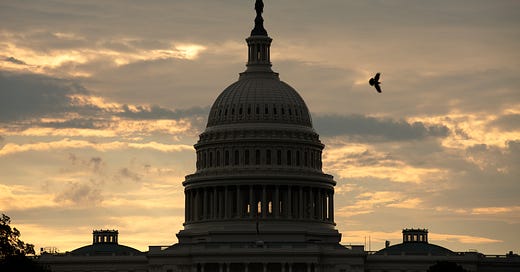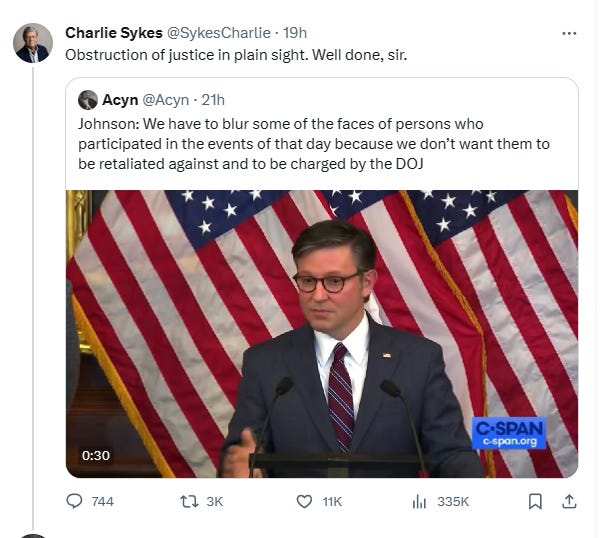Some further thoughts on a discussion Mona Charen and I had yesterday: There is more than enough reason to be alarmed about our moment — the polls, the crazy, the gathering storm of a Trump 2.0 presidency. Next year could be a horror show.
We probably should have been even more alarmed than we were about Donald Trump’s earlier plots against America and his attempt to overthrow the election. And it really could get worse.
Which is why all the alarm bells are flashing here and here and here and here.
As you know, I contributed my own bit to the festival of panic in last Friday’s Morning Shots: “You Are Really Not Sufficiently Alarmed” which I’m sure raised everyone’s morale.
But being alarmed is one thing. Despair is quite another.
Alarm can either motivate or it can debilitate. It can focus the mind for the fight or depress us to the point where we’d rather simply go off to tend our gardens. And that’s how democracies die.
In yesterday’s Wapo, Greg Sargent pushed back against the Eeyores of the pundit world. “Enough with all the fatalism about a Trump dictatorship.”
Sargent argues that it is crucially important to recognize that the worst-case scenarios are not inevitable.
Trump is not our destiny.
Greg is clear-eyed about the dangers we face — he sees the same polls we all do, and he listens to Trump’s increasingly unhinged rants with the same anxiety as the rest of us. He writes:
The case for panic also rests on reports that Trump allies are aggressively preparing to purge the government of the sort of weak-kneed officials who internally resisted Trump’s designs last time. In a second term, some worry, Trump and his consiglieri would not be held back by legal limitations or even court rulings.
All that scheming does demand vigilance.
But it is also possible, Sargent warns, for the alarmism to take a dangerous turn toward darkness. ”Undue fatalism could even prove counterproductive, de-energizing voter opposition exactly when Trump is brazenly projecting his dictatorial intentions.”
The problem is that doom-saying can easily become schtick for some of the pundit class. Doom-laden hot takes can even become a kink of sorts; the ink stained Eeyores provide a balm to disappointment by simply assuming the worst. And, indeed, there is something comforting about wallowing in the warm bath of no-hope. (Because “it’s the hope that kills you,” amirite?)1
This is, however, is exactly what the authoritarians want. They want you to be afraid, but they are more than willing to settle for apathy and dejection masquerading as realism. Sargent notes this dark irony:
Ruth Ben-Ghiat, a scholar of strongman rule, has noted that a time-tested tactic of authoritarian leaders is to disarm the electorate by suggesting their glorious triumph is inevitable.
“Authoritarians create a climate where they seem unstoppable,” Ben-Ghiat told me. “Creating an aura of destiny around the leader galvanizes his supporters by making his movement seem much stronger than it actually is. The manipulation of perception is everything.”
The aim is to hypnotize voters into forgetting the power and numbers that they possess, persuading them that politics is a hopelessly sordid and disappointing exercise.
“But,” he writes, “that is not the story of the Trump years.”
Trump has been defeated.
He is being held accountable.
And there is a coalition of opponents who constitute an anti-MAGA majority.
When Trump executed his 2017 ban on many Muslims entering the country, crowds descended on airports in a surprising outpouring of support. A year later, historians Lara Putnam and Theda Skocpol documented an unexpected groundswell of painstaking political organizing among formerly apathetic middle-aged women to defend democracy, fueling Democrats’ 2018 midterm blowout.
During the 2020 election season, despite outbreaks of street violence, most voters saw protests against police brutality as peaceful, legitimate political activity, rejecting Trump’s effort to smear them in threatening terms. In the 2022 midterms, many prominent GOP election deniers lost, and fears for democracy were a key motivator for voters.
It remains underappreciated, but our national response to the antidemocratic menace of the Trump years has in some respects been surprisingly good — not just electorally but also institutionally. Trump’s gaming of the judicial system to overturn his 2020 loss hit a wall in the courts. By a wide bipartisan margin, Congress passed reforms to Trump-proof the system by which we count electoral votes.
**
To be clear here: the threats to democracy are very real. On a daily basis, Trump makes it clear what he intends to do. We see the GOP bending to his will, and the polls that suggest he has a genuine shot.
But despair is not a winning tactic, is it? There’s also a reason why it is considered a cardinal sin by the Catholic Church: despair refuses to acknowledge the goodness and mercy of God.
In that sense, political despair is also a sin against democracy, because it denies the possibility that the voters can also show the goodness, mercy, decency, and resolve to fight back. If we decide that they are too stupid, corrupt, or delusional to be trusted with self-government, we’ve also given up on hope for democratic renewal.
And, ultimately, this is all about hope vs. optimism. As the late Rabbi Sacks reminded us, they are not the same thing:
Optimism is the belief that the world is changing for the better; hope is the belief that, together, we can make the world better. Optimism is a passive virtue, hope an active one. It needs no courage to be an optimist, but it takes a great deal of courage to hope.
Greg Sargent’s final plea:
No more indulging in paralyzing fatalistic nightmares. We need a spirit of guarded and vigilant confidence — one that is fully aware of what’s at stake while drawing inspiration from the cognizance that this country has thwarted Trump in the past — and will likely do so again.
We’re here for it.
Philip Bump: The GOP Stumbles Towards Impeachment
On Tuesday’s podcast: The smoking gun turns out to be a dud, but James Comer and the Republicans move ahead on their evidence-free Biden impeachment inquiry. The Washington Post’s Philip Bump joined me.
You can listen to the whole thing here. Or watch us on YouTube.
BONUS for Bulwark + Members
Alarm? Yes. Despair? No!
Our discuss of the politics of hope.
You can listen to the whole thing here.
Quick Hits
1. The Far Left and the Far Right Agree on Jew Hatred
Mona Charen in today’s Bulwark:
THEY CAME WAVING PALESTINIAN FLAGS and clad in the keffiyehs that have become a symbol of the Palestinian cause. Dozens of chanting protesters crowded the street outside Goldie, a vegan restaurant serving Israeli-inspired dishes in central Philadelphia, blocking traffic and chanting “Goldie, Goldie, you can’t hide. We charge you with genocide.”
What does this restaurant have to do with the war in Gaza? Nothing. It serves falafel to Philadelphians. It is owned by a Jew, who was born near Tel Aviv. And that’s enough.
2. The Ugly Real-World Consequences of Trump’s Loudmouth Campaign Rants
Health care is the next test for conservatives trying to out-conservative each other. By suddenly renewing his vows to kill the 2010 Affordable Care Act, Trump has now signaled what he expects from them. As in fealty, or else.
The law is not in immediate danger, but Trump’s rhetoric is not without cost. That’s because ten states—all with conservative Republican legislatures, governors, or both—still have not expanded Medicaid insurance to an estimated 1.9 million adults, mostly the working poor. This option is largely federally funded, but the chance of further expansions was always iffy in the ten GOP-dominated holdout states. It seems still more remote now, even as the ACA and its Medicaid component have proven both helpful and durable. Why?
3. The Rise of the Anti-Marriage Right
Elizabeth Grace Matthew in the Bulwark:
Among the most prominent of these influencers is former kickboxer Andrew Tate, who has made disturbing inroads into the lives and psyches of millions of teenage boys and young men. (He has also been charged with rape and human trafficking.) Tate teaches his youthful followers that marriage is “completely and utterly fruitless.” The 37-year-old Tate contends that women belong in the home, that monogamy is unnatural for men, and that marriage invites improper government intrusion into men’s sex lives. He glories in tales of choking and hitting sexual partners, and perfects his macho brand by posing shirtless with guns and in front of expensive cars.
Cheap Shots
Ted Lasso reminds us: “So I've been hearing this phrase y'all got over here that I ain't too crazy about. 'It's the hope that kills you.' Y'all know that? I disagree, you know? I think it's the lack of hope that comes and gets you."









I'll say it again: the two biggest mistakes we can make heading into 2024 are assuming Trump can't possibly win, and assuming Trump definitely will win.
Sargent is right, we need to keep on keepin' on, definitely, but if you want to see how "smart" people can be co-opted by Trump and fall into the "he isn't any worse than the Biden Administration", watch Liz Cheney on CNBC this morning trying to convince Joe Kernen that Trump is a threat. He simply doesn't see it. He is generally rude, and he fillibustered for a bit until she asked if he would let her speak.
He is no doubt voicing all the talking points that Republicans have been parroting for decades. But turning this ship around is going to take A LOT of work and a little bit of luck.